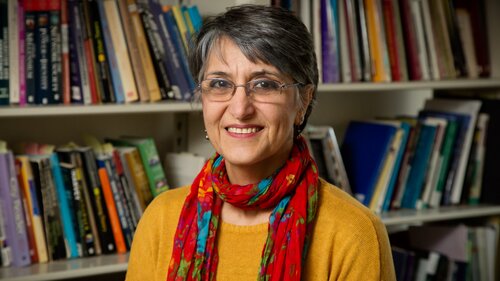
Contact Information
Champaign IL 61820
Biography
As an urban scholar of globalization my scholarship is situated at the intersection of sociology, geography, planning, and feminist studies, using case study and ethnographic methodologies. A native of Iran, I did my undergraduate studies at the College of Fine Arts at the Tehran University. I graduated with a Master's degree in Architecture at the Norwegian Institute of Technology in Trondheim and then completed my doctoral studies at the University of California, Berkeley. Over the years my research and teaching has spanned several countries including Chile, Mexico, Canada, Australia, South Africa, the United States and most recently Togo. In 2014 I was named as University Scholar, a prestigious award the University of Illinois bestows on its faculty for excellence in teaching, scholarship and service.
My research concerns social and institutional aspects of urban development and planning that address basic human needs including housing and urban infrastructure and services that support it. I am particularly interested in the global and local development processes and contingencies involved in the formation of the city and citizens' struggles for dignified livelihood — namely, how groups disadvantaged by class, gender, race and ethnicity mobilize for resources such as shelter, basic infrastructure, and services and how institutional arrangements facilitate and frustrate provision and access to such vital urban resources. My scholarship on global inequalities, the kinds of questions I ask, the methodologies I use, and the insights I aspire to offer the public are all greatly influenced by my activist past and drive for social justice. In the 1980s and 1990s, I studied this relationship through the experience of low-income communities, particularly female-headed households in Latin America; since the mid-1990s I studied the struggle for justice and equity through the experience of racialized township residents in post-apartheid South Africa. In my most recent project, published as Global Heartland: Displaced Labor, Transnational Lives and Local Placemaking, I studied the relational development processes of placemaking in Togo, Mexico and Illinois. Using a relational frame of analysis that exposes global inequalities, Global Heartland reveals the development connections and dependencies across seemingly far-away communities across the globe that are intimately connected through everyday practices of their transnational families. For a documentary based on Global Heartland interviews, see "Moving Flesh," produced by artist-scholar-activists Sarah Ross and Ryan Griffis
My teaching covers the following: planning theory, international and community development; socio-cultural formation of cities; grassroots strategies and urban movements; global inequalities, migration and transnational urbanism; urban governance and the reconfigured state-society relations for provision of infrastructure, basic services and housing. I also serve as the Director of the PhD program and the coordinator of the Transnational Planning Stream at DURP. Students who are interested to find out more about the PhD in Regional Planning or about Transnational Planning Stream and the International Programs and Activities at DURP should consult the respective websites and feel free to contact me for further information.
Courses Taught
I teach at both undergraduate and graduate levels. My teaching covers the following: planning theory, international and community development; socio-cultural formation of cities; grassroots strategies; migration and transnational urbanism; the reconfigured state-society relations for provision of basic infrastructure services and housing; and a critique of the dominant global neoliberal policy framework. I also serve as the Director of the PhD program and the coordinator of the Transnational Planning Stream at DURP. Students who are interested to find out more about the PhD in Regional Planning or about Transnational Planning Stream and the International Programs and Activities at DURP should consult the respective websites and feel free to contact me for further information.
Additional Campus Affiliations
Professor, Urban and Regional Planning
Professor, Gender and Women's Studies
Affiliate, Geography and Geographic Information Science
Professor, Center for the Study of Global Gender Equity
Professor, Center for Latin American and Caribbean Studies
External Links
Highlighted Publications
Miraftab, F. (2016). Global Heartland: Displaced Labor, Transnational Lives, and Local Placemaking. Indiana University Press.
Recent Publications
Huq, E., & Miraftab, F. (2024). Stateless in Informal Settlements. In Sites of Statelessness: Laws, Cities, Seas (pp. 107-120). State University of New York Press. https://doi.org/10.2307/jj.20829470.10
Miraftab, F., & Huq, E. (2024). Urbanizing social reproduction: (Re)thinking the politics of care in capitalist urban development. Environment and Planning D: Society and Space, 42(2), 234-253. https://doi.org/10.1177/02637758241230179
Miraftab, F. (2023). A global conversation of equals. In A Manifesto for the Just City (Vol. 3, pp. 46-49). TU Delft.
Miraftab, F. (2023). Woman, life, freedom: Short introduction to the struggles in Iran. In A Manifesto for the Just City (Vol. 3, pp. 50-55). TU Delft.
Razavi, N. S., Adeniyi-Ogunyankin, G., Basu, S., Datta, A., de Souza, K., Ting Ip, P. T., Koleth, E., Marcus, J., Miraftab, F., Mullings, B., Nmormah, S., Odunola, B., Burgoa, S. P., & Peake, L. (2023). Everyday urbanisms in the pandemic city: a feminist comparative study of the gendered experiences of Covid-19 in Southern cities. Social and Cultural Geography, 24(3-4), 582-599. https://doi.org/10.1080/14649365.2022.2104355